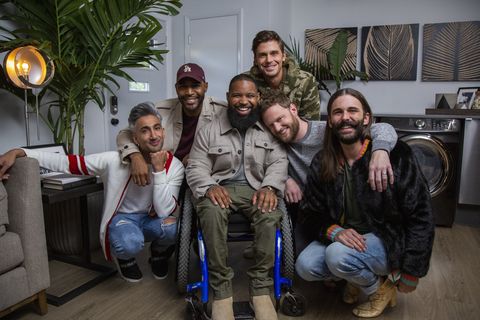
Wesley from 'Queer Eye' on Meeting the Man Who Shot and Paralyzed Him
07/19/2019• Queer Eye Season 4 Episode 2 features Wesley Hamilton, who was paralyzed after being shot seven years ago.
• Wesley spent a week with the Fab Five, who he tells Men’s Health totally changed his life
• At one point, Karamo brought Wesley to meet the man who shot him—he tells us what that was like.
The standout hero of Queer Eye season four is revealing more details behind that emotional meeting with the man who shot him.
The second episode of the show’s new season, titled “Disabled but Not Really,” features a man named Wesley Hamilton, who was shot and paralyzed seven years ago. Since then, he’s used his injury to become a better person—and when the Fab Five come to town, they help Wesley move even further down that path of self-actualization.
If you’ve ever watched Queer Eye, then you know that every installment is an emotional rollercoaster. On Wesley’s episode, the most moving moment of all comes when Karamo sets up a face-to-face meeting between Wesley and the man who shot him, Maurice. Incredibly, the two have a civil, understanding discussion, which concludes not only with good vibes, but with Wesley thanking Maurice, saying he feels empowered by the life he’s since been given.
On that moving meeting with Maurice:
Wesley told Men’s Health that as soon as he knew he was going to meet Maurice, he wanted to find closure more than anything else. “I knew the power of it, but I also knew that I was ready to be free,” he said.
One thing that didn’t make the episode? The fact that the meeting almost didn’t happen. In an email to Men’s Health, Karamo said that up until five minutes before walking into the restaurant for their face-to-face meeting, Wesley and Maurice were both about to walk away. “I was navigating both of their fears and telling them to trust me,” Karamo wrote. “The conversation they had lasted almost two-and-a-half hours. But in the end they were able to shed light on the violence epidemic that is facing so many communities, while also finding healing and closure.”
“The moment it was done, it was such a relief.”
Once the meeting was over, Wesley said it didn’t seem as difficult as he’d thought.
“I think the message behind it was: it always seems hard until its done,” he said. “It was hard. It was scary. I mean, you’ve got all these emotions, but the moment it was done, it was such a relief. It was a relief, because it didn’t seem that hard once I’d actually did it.”
The key, Wesley says, was coming into the encounter with an open mind. He knew who this guy was, and he knew what had happened, but he was willing to hear him out. He was willing to understand. He was willing to forgive—and he was not only willing, but wanting to move on.
“I didn’t come in with a blame game,” Wesley said. “If I came in with a blame game, it could’ve gone a whole different way. But I think because I was able to blame myself, and take accountability, it gave me instant relief once it was done.”
In his email, Karamo stressed an important takeaway from the episode: “I want people to realize that these two men weren’t bad—they were a product of systemic issues that caused them to believe that violence was an option,” he said. “I want people to … realize that through healthy/supervised conversation, anyone can begin to take the steps to heal from a traumatic situation.
“And lastly, that sometimes the greatest moments of defeat that we experience are actually the greatest lessons we need so that we can gain a better understanding of ourselves and the world around us,” he wrote.
Christopher Smith/Netflix
Where Wesley is now:
In the time since the episode was filmed last fall, Wesley has continued feeling great. It took a while, but he finally feels comfortable in his Bobby-ified home, which was designed to make his life easier.
“Dude,” he said. “It took me at least six months before I even got used to the house, because it was just a game-changer to me.”
Because it had been so long—seven years, after all—Wesley had forgotten what it was like to be comfortable. His home, hotels, none of it was ever sufficient. So, he always did what he knew how to do: adapt.
“It was big changes, but it was small,” Wesley said. “All you had to do was think a little bit. Think about what it could be.”
Not only did the remodeled home change his life, but it also has changed his social life, too. He now feels more comfortable than ever, inviting family and friends over.
“Honestly, I even got in a relationship!” he says.
Wesley also founded his own non-profit, called Disabled But Not Really, where he aims to help other people with disabilities to feel empowered in their life, and embrace physical and mental fitness, and not feel restrained by any mental limits at all.
In the time since filming his episode, Wesley has maintained a steady presence on social media, posting frequently on Instagram. He’s even shared some of his more adventurous moments, like the time in April when he went skydiving:
View this post on Instagram
Reached every goal I actually set, now it’s time to rearrange that list. #bliss #grateful #blessed #victorylap #longlivenipsey #skydive
A post shared by W E S H A M I L T O N (@iamweshamilton) on
Wesley said his Queer Eye experience made a lasting impact on him: “I mean, the Fab Five?!” he said incredulously. “The way they came in in a week’s time and changed my life, I’ll be forever grateful for them.”
Source: Read Full Article


